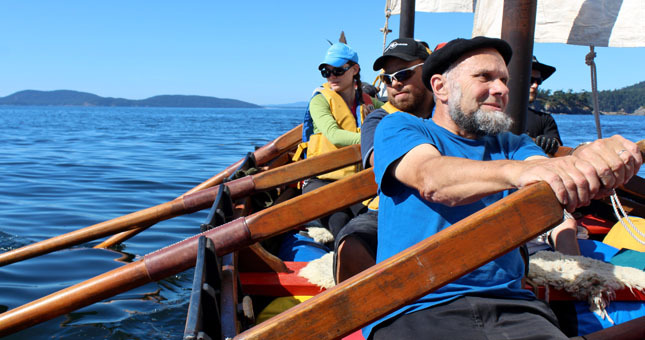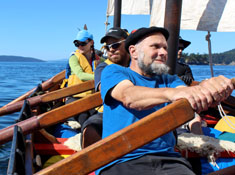
Chris Wyper
Rhythms of Connection
A Thursday evening on the Georgia Strait, eight Regent College students rowed in perfect unison singing a ditty composed by one of our comrades: “Hey-ho, keep the boat afloat, rowing rowing, home to Retreat Cove, may the winds be with us, may the winds be with us, hey-ho. . . .” There was rhythm and focus in each oar stroke.
Eight days earlier, twelve students left Retreat Cove on Galliano Island in two boats. We didn’t quite know each other or what to expect. We were each drawn to the “boat course” for slightly different reasons, but it was together that we would explore the themes of wilderness, technology, and creation as we voyaged around the Gulf Islands.
I was initially drawn to the course for its content. Technology and creation were particular themes I wanted to explore further. However, as Winter term rushed to an end and quickly turned into Spring Session and then Summer Session, all I wanted to do was get out of Vancouver. The boat course shined as a beacon of hope.
A friend reminded me that the course was not a holiday and it would be hard work, but the course did not shine as a beacon because it signalled the type of rest that comes from disconnecting from one’s usual work. Rather, it signalled the type of rest that comes from disconnecting from one’s usual world. As a student, I would still be engaging in my usual “work” (although in an unusual way), but the compound busyness of my “world” would be on hold. Without any communication devices, I would disconnect from scheduling dinner dates and Skype dates. I would disconnect from online news sites and my Facebook newsfeed. I would disconnect from a timetable full of other subjects and work shifts. I would have to entrust those I loved to God’s care and disconnect from them too.
Yet aside from those eight days, it is not possible to live my life disconnected from my world. I have a degree to complete. I need to earn money. I am concerned for what is going on in the world and I want to enjoy the relationships God has blessed me with. However, the boat course has helped me consider how to meaningfully connect with that world and seek rest not just from it, but amidst it. Here are some ways I am trying to connect well—perhaps these ideas will help you too.
1) Allow other sounds to be heard
To connect well, I need to think critically about the technology I use. In his essay, “Getting Along with Nature,” Wendell Berry says, “A proper human sound, we may say, is one that allows other sounds to be heard. A properly scaled human economy or technology allows a diversity of other creatures to thrive.” Berry uses “human sound” metaphorically to describe the impact that things we produce has on the world. Technology is a key example. It can be a good thing, but how am I using it? Is it in relation to my real needs? In what way is it impacting the world I live in? Does its production or usage hinder the flourishing of other creatures?
I am still pondering these questions, but reorienting my vision to think critically about technology and adjusting my hearing to listen to the world around me is a necessary starting point to connecting well and resting from that connectedness.
2) Be fully present
One of the most enriching aspects of the course was the community that developed. There was just us, and in the “just us” was rest. Disconnecting from other communities to invest solely in this one allowed me to listen well, learn well, enjoy well, serve well, and be well. These blessings rested and refreshed me.
I am now back in the world of connectedness with multiple and overlapping communities. I have learned that there are times to disconnect from other communities in order to focus on the one you are in, to be fully present to others. I have found that turning my phone—my primary connecting device—on silent and not touching it for the duration of a community gathering to be a very good place to start.
3) Begin and end in rhythm
Our voyage had a rhythm that was maintained by morning and evening prayer. This liturgy provided a framework for our time together that constantly reaffirmed our voyage was not done apart from God. Each morning, we committed ourselves to seeking God, asking him to guide us in the day ahead. Each evening, we handed ourselves, our tasks, and each other over to him, and then laid down in his peace. We do not live normal life apart from God either, but in all our busyness, it’s easy to lose sight of this.
Since the conclusion of the course, I have continued this practice of morning and evening prayer. Developing a rhythm where my day is framed by this liturgy has helped me make better choices about connecting and resting, as well as being itself a way of connecting with God and there finding rest from the world around me.
The rhythm and focus of our final leg of rowing was something that had been cultivated over the course of the voyage. We had to learn how to do it. There were times when all or one of us was out of rhythm and we needed to refocus to rediscover it. Finding a rhythm of connecting and resting well, especially in a world of compound busyness, is similar. We have to learn how to do it. But when we fall into a rhythm that allows us to fly across the water, there is both joy and rest, and these are rich blessings indeed.









